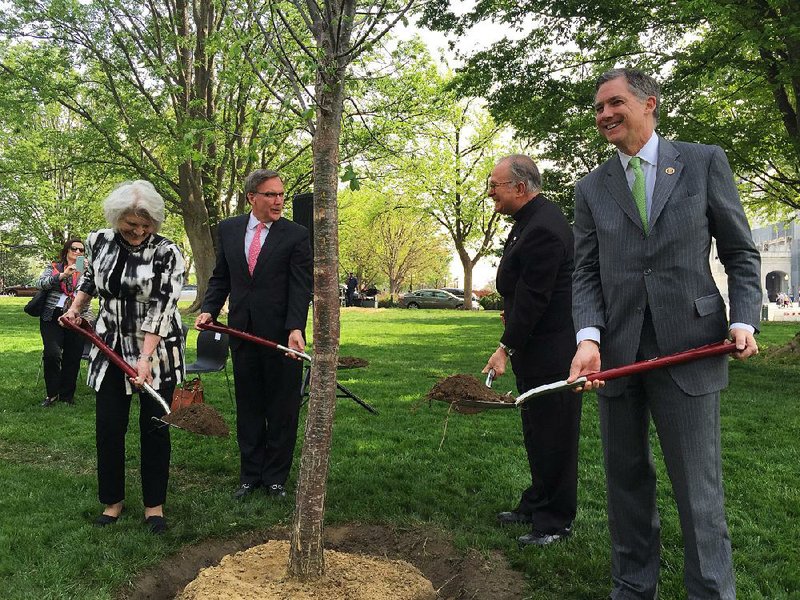WASHINGTON -- The widow of former U.S. Sen. J. William Fulbright helped plant a tree on Capitol Hill on Thursday to mark the 70th anniversary of the international education program that bears his name.
Harriet Mayor Fulbright, Architect of the Capitol Stephen Ayers, House Chaplain Pat Conroy and 2nd District U.S. Rep. French Hill each grabbed shiny shovels and tossed soil around a two-story-high American elm.
More than 50 people gathered to mark the occasion, including former legislative staff members from Arkansas and Fulbright scholars from around the world.
Ayers predicted the tree, which will stand across the street from the Russell Senate Office Building, would thrive. The American elm is "known for its hardiness," he said, adding, "This elm's branches will grow and spread and create a cathedral-like effect as you walk underneath them in just a few years."
Conroy said a prayer, blessed the tree and praised "this world-changing program which has increased the chance that nations will learn at last to live in peace and friendship."
The U.S. State Department calls the Fulbright Program the "flagship" international educational exchange program sponsored by the U.S. government and says it was "designed to increase mutual understanding between the people of the United States and the people of other countries."
Elected to the U.S. Senate in 1944, William Fulbright -- a former Rhodes Scholar and University of Arkansas president -- introduced his Fulbright Program legislation in September 1945, a matter of days after Japan's formal surrender and the end of World War II.
He advocated that the federal government promote "international goodwill through the exchange of students in the fields of education, culture and science." He proposed selling surplus overseas U.S. government property and using the money to pay for the educational endeavor.
On Aug. 1, 1946, President Harry Truman signed the legislation into law. Since then, the program has evolved and expanded. More than 360,000 people in more than 160 nations have been "Fulbrighters," including more than 50 Nobel prize recipients.
Hill, a Little Rock Republican, spearheaded Thursday's tribute.
"Sen. Fulbright has engraved his name in Arkansas history, and his work has had a mighty impact on the lives of countless youth around the world," Hill said during the brief ceremony.
Harriet Mayor Fulbright said her husband hoped that the Fulbright program would foster peace.
The tribute to Fulbright "is truly a wonderful and unexpected honor, and I can't think of a more beautiful symbol than a tree of that kind for this program that my husband founded," she said.
A Section on 04/22/2016
